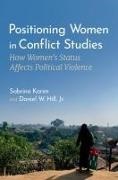Ulteriori informazioni
In Positioning Women in Conflict Studies, Sabrina Karim and Daniel W. Hill, Jr., re-evaluate the literature on gender, international politics, and conflict to reveal that the term "gender equality" is often used to refer to four distinct concepts: women's inclusion, women's rights, harm to women, and beliefs about women's roles. They develop original measures for each of these concepts and examine their impact on inter-state war onset, intra-state conflict onset, state repression/human rights violations, and terrorism. Overall, Karim and Hill demonstrate how the conceptualization and measurement of gender equality and women's status is critical in understanding how to reduce political violence globally.
Sommario
- Introduction
- Part I: From "Gender (In)equality" to the Status of Women
- Chapter 1: Solving the Concept Stretching Problem
- Chapter 2: Solving the Measurement Invalidity Problem
- Part II: The Status of Women and Political Violence
- Chapter 3: Women's Inclusion and Political Violence
- Chapter 4: Women's Rights and Political Violence
- Chapter 5: Harm to Women and Political Violence
- Chapter 6: Beliefs about Women's Gender Roles and Political Violence
- Conclusion
- Notes
- References
- Index
Info autore
Sabrina Karim is the Hardis Family Assistant Professor in Government at Cornell University. She directs the Gender and Security Sector Lab funded by Global Affairs Canada and is a recipient of a National Science Foundation Faculty Early CAREER Development Award. Her research focuses on international involvement in security assistance to post-conflict states, gender reforms in peacekeeping and domestic security sectors, and the relationship between gender and violence. She is the co-author of Equal Opportunity Peacekeeping: Women, Peace, and Security in Post-Conflict States.
Daniel W. Hill, Jr., is an Associate Professor of International Affairs at the University of Georgia. His research focuses on violent political conflict, human rights, and international organizations and law. He has published on a variety of topics, including international human rights law and NGOs, state repression, police violence, terrorism, and quantitative methodology.
Riassunto
For decades, scholars have asserted that gender matters when it comes to domestic and international politics and that gender equality means more than the rights and inclusion of women in the political sphere. Yet the existing research on gender equality and violent political conflict tends to equate and conflate gender equality with observable indicators related to women's inclusion in formal politics. Consequently, this conceptual problem has impeded efforts to theorize and empirically examine the connection between gender equality, women's status, and political violence.
In Positioning Women in Conflict Studies, Sabrina Karim and Daniel W. Hill, Jr., develop an original framework to study the condition of women in peace and conflict that avoids conflating gender equality with other terms. Karim and Hill re-evaluate the literature on gender, international politics, and conflict to reveal that the term "gender equality" is often used to refer to four distinct concepts: women's inclusion, women's rights, harm to women, and beliefs about women's roles. They develop original measures for each of these concepts and examine their impact on inter-state war onset, intra-state conflict onset, state repression/human rights violations, and terrorism. The results suggest that the relationships between women's status and political violence are not uniform and vary across different aspects of women's status as well as different types of political violence. Overall, Positioning Women in Conflict Studies demonstrates how the conceptualization and measurement of gender equality and women's status is critical in understanding how to reduce political violence globally.
Testo aggiuntivo
This book makes significant advancements in the study of gender and political violence. Karim and Hill move beyond a traditional emphasis on gender inequality and derive four dimensions of women's status with Bayesian measurement models. In contrast to many other studies, their empirical findings show that these women's status dimensions do not always correspond to less frequent terrorism, civil wars, or interstate disputes. This book is a must-read for gender and conflict scholars.

